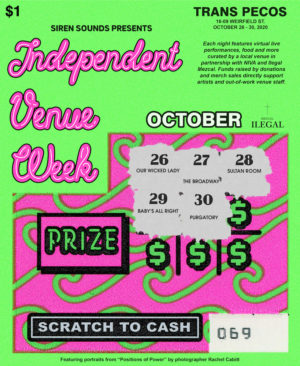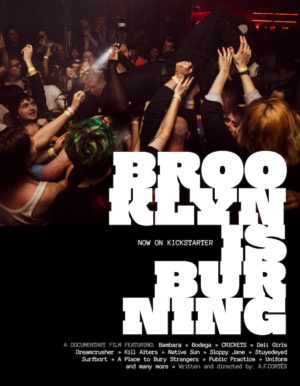Photos by Madison Carroll
Having been born from their musical commonality in Brooklyn’s DIY scene, it should come as no surprise that The Wants don’t feel the need to conform to the expectations that come from the scene itself. Though they came together inside that scene, The Wants see themselves as somewhat outside of it too. Maybe that’s why their music has been compared to such a diverse range of groups, everything from Depeche Mode to The National. If there is one thematic element that comes up from listening to their two singles “Clearly in Crisis” and “Fear of Society”, it might be a consistent anxiousness that can only be cured, ironically, from making music. However, The Wants don’t view their music as pessimistic at all. Their hopefulness is in the energy with which they create and perform. Though the lyrics themselves might seem skittish and self-conscious, those are not the emotions felt after listening to the songs themselves. On the contrary, The Wants to make music that makes you want to dance like nobody’s watching. And that’s just about the most hopeful feeling in the world.
You’ve written about the overarching anxiety which accompanies being a creator. How do you use that anxiety to fuel your ability to create?
Jason Gates: I used to joke with Madison about a competitiveness with how neurotic we are. I’ve learned that it’s somewhat simple for me … if I’m not working on music, I’m more anxious.
Madison Velding-VanDam: I pace around my room a lot.
Heather Elle: Creating and performing music is a natural anti-anxiety, and knowing we can move and inspire others who may be feeling less-than-perfect is why I get up on stage.
You met in the DIY scene, do you feel like the creative freedom of the scene had a hand in creating your unique sound? Do you think if you had come together elsewhere that you might have gone in a different direction?
JG: While we are all rooted in the Brooklyn/NYC “scene”, our band and our sound is outside of it. I think we sound the way we do because we refuse ideas and elements that we don’t want to be associated with. What’s left is what we can deal with, fused with our individual and musical personalities.
MVV: “Scenes” can be a constraint on creative freedom. There is often a genre preference in scenes and those influential in the scene, push for the artists that align with their tastes. This isn’t necessarily a bad thing, but it can be a constraint. Sometimes artists actively align what they’re making with the tastes of their scene so that they can have access to the opportunities being part of the scene provides. My hope is that we acknowledge this reality, while focusing more on doing our own thing.
Your music has a very 80s-90s vibe to it. Why do you think that those eras are having such a resurgence these days?
JG: Is there a resurgence on a mainstream level? There is a lot of music I like from those eras. That was an interesting time where songwriting and studio experimentation joined in an inspiring way. Musicians played instruments with computers and the studio starting to be treated like an instrument, etc.
HE: Psychologists have confirmed that our brains bind us to the music we heard in our formative years more so than anything we hear as adults, no matter how sophisticated our tastes grow. My brain is bound to the early 00’s, and those artists’ brains are most likely bound to the 80’s; therefore, according to the transitive property, my deepest musical instincts are also bound to the 80’s. I can’t speak for my peers, but this logic makes sense to me.
MVV: Yeah, people are deeply nostalgic for the music they heard when they were a kid — it tickles our basal ganglia. Hopefully, a lifetime spent adding to those early influences has some effect! The 80s were a prime era for radio hits. The Psychedelic Furs “Love My Way” and Depeche Mode “Enjoy the Silence” come to mind as favorites. The 90s ushered in a darkness to mainstream culture that I really enjoyed as a kid. I’m both thankful and appalled that my parents let me indulge in Ren & Stimpy.
A lot of your music talks about feeling the need to keep yourself safe. What do you keep yourself safe from?
JG: Myself.
MVV: Men should be encouraged to be more vulnerable. My lyrics are a tool to empower myself in my most vulnerable states.
Our generation has a very real need to know ourselves so thoroughly that we end up picking ourselves apart more so than almost anyone else. Where do you think that comes from? Do you find inspiration in that self-reflection/ flagellation?
JG: In part, it might come from cameras being everywhere. Everyone is getting used to being watched. I don’t think that’s a natural feeling. I think it’s a feeling that should make us very cautious.
MVV: I think our new found self-reflection originates in the stew of information and knowledge in which we’re all wading.
HE: Every generation worries about the next generation, and both Generation X and the Baby Boomers think self-obsession is unique to us Millennials. It’s nothing new. Instead, it’s just become more apparent through the technology thrust into our hands and the social media personas that we’re pressured to maintain.
What about future tracks? Do you think you will ever venture into more hopeful sounds?
JG: Hahaa! Hopeful?!
MVV: At the time of this interview we’ve only released the singles ‘Clearly a Crisis’ and ‘Fear My Society’, so I suppose this is a fair question. Our music is generally high-energy and danceable, which I see as an attestation of our hopefulness.
What do the Wants want? If a genie granted you each a wish, what would you wish for?
JG: Challenging music, good food, love, and money. Yeah, I know that’s four wishes, but they all leave me with one satisfied feeling.
MVV: Being immortal only if I listen endlessly to Alphaville’s “Forever Young”.
HE: Another president.
You can catch The Wants this Friday at The Broadway for the next Alt Citizen x DIY show — get tix here













